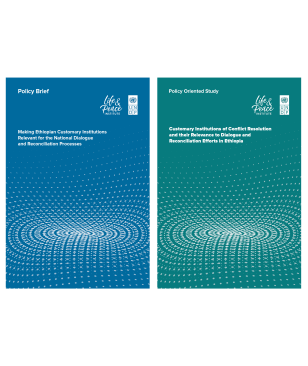Policy and Research Briefs: Making Ethiopian Customary Institutions Relevant for the National Dialogue and Reconciliation Processes
Policy and Research Briefs: Making Ethiopian Customary Institutions Relevant for the National Dialogue and Reconciliation Processes
October 3, 2023
Customary Institutions (CIs), Ethiopian ancient instruments for conflict prevention and management, have served as important platforms in preventing and resolving conflicts and playing roles in smoothening broken societal/communal relationships and building/strengthening societal bonds.
Ethiopia is the home of various ethnic groups with indigenous mechanisms of conflict resolution with peculiar features and commonalities. The commonalities manifest through principles, values, norms, and beliefs. CIs naturally focus on maintaining balance, encouraging compromise; pursue and focusing on the restoration of peace within the community rather than punishing the wrongdoer. The concept of justice in local communities extends much more than simply punishing the criminal and compensating the victim. This is at the heart of restorative justice mechanisms wherein punishing the offender is not the main agenda but mending social relationships via forgiveness eventually. This is particularly important in deeply divided societies like Ethiopia where these groups are ethnically and politically polarized and mobilized by distinct factors. CIs and their leaders, however, have better legitimacy compared to the formal justice system with the indigenous capacity to resolve conflicts to varying degrees.
These age-old practices and traditions synergized with the national dialogue process initiated in 2021 will have tremendous contributions to facilitate and ease the dialogue process as well as the resolving mechanisms. Hence, this Policy Brief argues that the Ethiopian national dialogue process has much to gain and apply the valuable practices and lessons from the Ethiopian CIs.
Furthermore, though numerous studies have indicated the value addition and limitations of customary dispute resolution mechanisms (CDRMs), their contribution to national dialogue and reconciliation is despite some limitations. This Policy Brief seeks concurrently to contribute to bridging this gap.

 Locations
Locations
